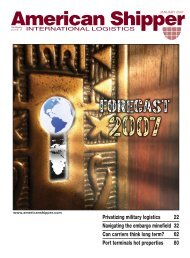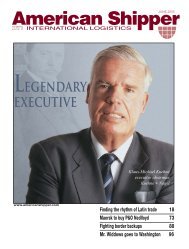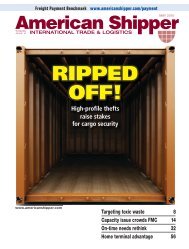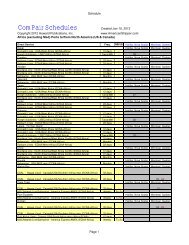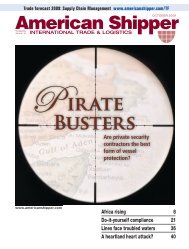McLean's - American Shipper
McLean's - American Shipper
McLean's - American Shipper
- No tags were found...
Create successful ePaper yourself
Turn your PDF publications into a flip-book with our unique Google optimized e-Paper software.
Several senators pushed for budgetamendments to support a separate port securitygrant program and increased funding.Menendez offered an amendment to tripleport security grants. The bill would add $965million for port security efforts in fiscal year2007, increase funding for research and developmentof cargo scanning and port securitytechnologies, and provides assistance fordeveloping countries to improve their abilityto scan and inspect containers.Congress appropriated $175 million forport security grants last year after the Bushadministration only requested $46 millionfor the fiscal year 2006 budget. DHS hasdistributed about $708 million during thepast four years.Sen. Kay Bailey Hutchison, R-Texas,called for quick passage of her bill directingthe expansion of the CSI.Rep. Frank Lobiondo, R-N.J., chairmanof the House Transportation and Infrastructuresubcommittee on Coast Guard andmaritime transportation, introduced a billto require security officials at U.S. ports beU.S. citizens.Several proposals attempt to correctweaknesses in C-TPAT and CSI.Last November, Sens. Susan Collins,R-Maine, and Patty Murray, D-Wash., coauthoredthe Green Lane Maritime CargoSecurity Act, which would provide $835 millionin each of the next five years to expandCSI and C-TPAT, provide extra funds for portsecurity grants, create a cargo security policyoffice in DHS and implement other measuresto protect ports and cargo from terrorists.Collins said CSI and C-TPAT were goodprograms in concept that do not work wellbecause they have been underfunded byCongress and the Bush administration.“We want more aggressive implementationof those programs and we are willingto back it with the funding,” she said at apress briefing on Capitol Hill. “I feel likethe current uproar will build support formore congressional funding.”The Government Accountability Officelast year reported that 17.5 percent of highriskcontainers are X-ray inspected overseasby governments participating in CSI. Thereare 43 ports that allow CBP inspectors to helptarget outbound shipments for inspection.“Our bill, by providing steady funding forTRANSPORT / PORTSthat program, would allow more inspectorsto be stationed overseas” to help increase thenumber of inspections, Collins said.The bill would also give additional resourcesto CBP for C-TPAT, which has beencriticized for being slow to check whethercompanies are implementing promisedsecurity measures before they receive reductionsin inspections.The bill requires CBP to end its practiceof granting benefits to members before theyundergo a validation process.Flynn told the House Armed ServicesCommittee that he believes the C-TPAToffice needs to have at least 500 specialiststo validate companies and their suppliersaround the world, five times CBP’s currentcapability. CBP has 88 supply chain securityevaluators and hopes to reach its target of 156officers this summer.Collins and Murray also criticized DHSfor trying to lump port security grants into ageneric infrastructure security grant program.Their bill would provide $400 million indedicated port security grants, as recommendedby the <strong>American</strong> Association ofPort Authorities.Caldwell added that if private firms arenot willing to do so then public entities suchas port authorities should run them.The International Longshoremen’s Associationtook a more tempered approach,urging Congress to force the Bush administrationto halt final approval until it conducteda more extensive investigation of theport sale’s national security implications.The ILA represents workers who movecargo in ports along the East and Gulf coasts.Longshoremen’s unions have complainedsince 9/11 that security is lax at ports, and thatgovernment attempts to require backgroundchecks on transportation workers couldunfairly cause some workers with criminalrecords to lose jobs. Longshoremen argue thatthey have a vested interest in high securitybecause they would be in danger if a terroristattack were to occur in a port. Some in theindustry see union calls for the governmentto require cargo handlers to inspect emptycontainers to make sure no weapons are beingsmuggled through a port as an effort to gainadditional work for their members.One company that was willing to discuss thepossibility of splitting off P&O’s U.S. assetsfrom the rest of the deal was Eller & Co.Eller subsidiary Continental Stevedoring& Terminals, which is a joint venture partnerwith P&O at the Port of Miami TerminalOperating Co., filed suit in Florida askinga judge to block the sale because it is beinginvoluntarily dragged into the deal to workfor DP World. The Eller subsidiary handlescargo for P&O in Miami, and said it mayseek more than $10 million in damages.“Eller sees this as a national security issue”because the U.S. government would have ahard time ensuring a foreign governmentcomplies with port security rules, JosephMuldoon III, an attorney representing Eller,told <strong>American</strong> <strong>Shipper</strong>. “It raises all sorts ofquestions such as sovereign immunity.”Terminals are required to develop vulnerabilityassessments and security plans incoordination with the Coast Guard that outlineprocedures for controlling access to thefacility, verifying credentials of port workers,inspecting cargo for tampering, designatingsecurity responsibilities, training and reportingof all breaches of security or suspiciousactivity, among other measures.“These documents are sensitive andshouldn’t be shared with a foreign governmentthat could possibly be infiltrated,”Muldoon said.Eller believes the solution is to put theMiami terminal and others in U.S. hands.Muldoon said in early March that Ellerwas interested in buying some or all of theport facilities if the deal died. Eller wouldconsider many options, including being partof a group of investors, to buy the P&Oterminals, which analysts have valued atabout $600 million to $700 million.Eller’s financial capabilities could not beindependently verified and representativesfor the privately held company were unableto provide revenue figures. However,the Associated Press reported that in thecompany’s court filings in Britain, Ellerplaced the potential loss of business in Miamiat $150 million if authorities shut down thejoint venture.DP World would not be harmed by givingup the North America facilities becausethey only represented less than 10 percentof P&O’s business, he added.Meanwhile, Hunter, the powerful chairmanof the House Armed Services Committee,and Rep. Jim Saxton, R-N.J., fileda bill to halt the DP World acquisition andrequire foreign companies that already owncritical infrastructure such as port terminals,airports, power plants to sell off their investmentsto U.S. companies.In a letter to House colleagues, Huntersaid <strong>American</strong>s would have to own andcontrol 51 percent of a company that operatescritical infrastructure. The DefenseDepartment, assisted by the Department ofHomeland Security, would be responsiblefor creating a list of facilities that are vitalto national or economic security or publichealth and safety. Foreign companies on thelist would have to divest their properties.Companies in control of critical infrastructurewould need a chief executive officer,chairman and majority of the boardof directors who are U.S. citizens, someindependent directors, as well as a boardand security oversight committee approvedby the Defense secretary, according to thebill.■AMERICAN SHIPPER: APRIL 2006 87



